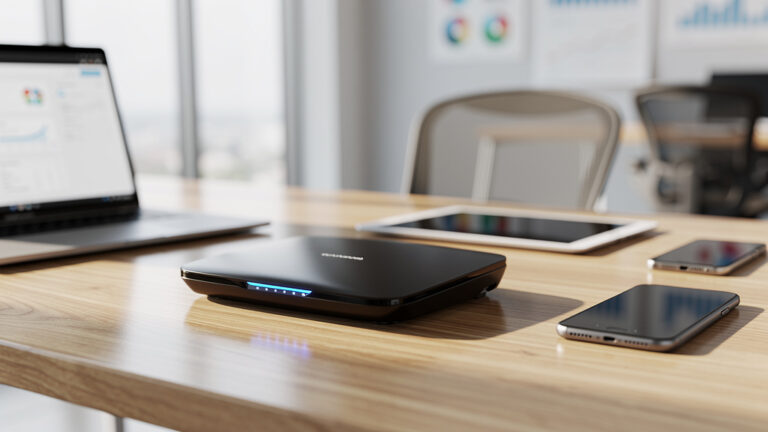Short answer: Yes, a WiFi owner can sometimes see where you connect on their network — typically your device, the amount of data, connection times, and often the domain (for example, example.com). They cannot read the pages, searches, or messages inside HTTPS/TLS traffic. With encrypted DNS (DoH/DoT), newer TLS protections like ECH, and tools such as a VPN or iCloud Private Relay, even the domain you visit may be hidden from the local network.
In this article, we explain what a WiFi owner can and can’t see in 2026 and the practical steps you can take on iPhone and Android to lock down your privacy without breaking everyday browsing.
How WiFi Networks Work
Routers and WiFi networks move your data between your device and the internet. Because your traffic flows through the router, the person who controls that network can usually view device identifiers, connection times, data volumes, and some network metadata. That does not mean they see everything you do. What’s visible depends on encryption (HTTPS/TLS 1.3), DNS settings (standard vs. encrypted), newer protections like ECH, and whether you use tools like a VPN or Private Relay.
This means some insights into your activity can be exposed to whoever controls the WiFi router, but the actual content of secure sites is encrypted. Your choices — like enabling encrypted DNS or using a VPN — can sharply reduce what’s visible.
See also: What is SSID for WiFi Explained!
The Key Question – Can a WiFi owner see what sites I visit on my phone when I use their network?
Generally, they can see that you connected to a site and often the domain name (for example, example.com) via DNS or the TLS handshake. They cannot read the page content, searches, or messages inside HTTPS/TLS. If you enable encrypted DNS (DoH/DoT) and your destination supports ECH, the network may not reliably learn the exact domain either. Using a VPN or iCloud Private Relay routes your traffic through an encrypted tunnel so the WiFi owner typically sees only that you connected to the VPN/relay, not your destinations.
To understand how to better secure your privacy, it helps to know precisely what’s visible — and what isn’t — before you choose protections.
What Exactly Can A WiFi Owner See?
When you connect your phone or computer to someone’s WiFi, visibility depends on the router, its settings, and any monitoring tools. Here are the common cases:
1. Basic Router Traffic Logs
Most home routers can list connected devices, data usage, and timing. With standard DNS and older TLS handshakes, they may also log domains you connect to (for example, example.com) via DNS queries or the Server Name Indication (SNI). They do not see HTTPS page paths or form data. If you use encrypted DNS (DoH/DoT) and your destinations support ECH, even domain visibility can be limited.
- Which devices are connected to the network
- How much data is being used
- Often which domains are being accessed (not individual HTTPS pages)
With HTTPS/TLS 1.3, routers and casual observers cannot read the content of pages, searches, messages, or forms. They typically see only metadata and sometimes the destination domain — unless you add protections noted below.
2. More Advanced Traffic Analysis
Specialized tools can capture packets, but with modern HTTPS/TLS the content is encrypted. Tools like Wireshark cannot reveal your pages, searches, or messages by default. Content becomes readable only if the observer has the necessary decryption material (for example, session keys) or if SSL inspection is in place with a trusted certificate added to your device. Otherwise, only metadata such as IP addresses, timing, and traffic sizes may be analyzed.
3. Traffic Inspection for Security
Some routers include Deep Packet Inspection (DPI) meant to detect malware or policy violations. DPI does not expose the content of properly encrypted HTTPS/TLS traffic unless the network performs SSL inspection with a certificate your device trusts (common on managed school or work networks). Without that, DPI mainly sees metadata and can block or allow connections based on destination or behavior patterns.
4. Public Hotspot Providers Get More Data
On open public WiFi, captive portals may collect identifiers you provide (email, phone, social login) and can log session times and device details per their privacy policy. HTTPS protects page content, but metadata such as connection timing and the portal account you used may still be collected.
Can They See Visits from My Phone Specifically?
Phones behave much like laptops on WiFi: the router can log device presence and metadata, but HTTPS conceals content. What’s different on phones is the availability of built-in privacy features that reduce what a WiFi owner can learn:
- iCloud Private Relay (with iCloud+ on Apple devices): Encrypts Safari traffic and hides your IP from websites; network providers see you connecting to Apple’s relay rather than individual sites.
- Android Private DNS (DoT): Encrypts DNS lookups system-wide on Android 9+ so WiFi owners can’t easily read your DNS queries.
- MAC address randomization (iOS 14+/Android 10+): Uses a private WiFi address per network, reducing long-term device tracking by network owners.
These features, combined with HTTPS and optional VPN use, minimize what local networks can infer about your browsing.
How to Protect Your Browsing Privacy Over WiFi
WiFi owners and hotspot providers can monitor metadata, but you can reduce visibility substantially with a few steps.
Use a VPN (Virtual Private Network)
A VPN creates an encrypted tunnel between your device and the VPN server. This:
- Encrypts Your Traffic: Your data appears as unreadable ciphertext to the WiFi owner, preventing them from seeing your browsing content.
- Hides Your IP Address: Sites see the VPN server’s IP, not your device’s, adding another layer of obscurity.
When your phone is connected to a VPN, the local network typically sees only that you’re connected to the VPN, not which sites you visit.
A virtual private network (VPN) with strong encryption (for example, AES‑256) is an effective way to keep a WiFi owner from viewing your browsing destinations and content.
Check out your ISP and Online status Who is my ISP: Quick ISP Checker
Our Top 3 VPN Suggestions

- ✓ Compatibility with 20+ Devices
- ✓ 10 Simultaneous Connections
- ✓ DNS Leak protection
- ✓ 24/7 Support

- ✓ Protocol Selection
- ✓ Servers in 47 countries
- ✓ Unlimited Devices
- ✓ 24/7 Support
Use Tor for Added Anonymity
The Tor browser routes traffic through multiple relays and encrypts it end‑to‑end, obscuring both your IP and destination from the local network. It can be slower and some sites may not work smoothly, but when privacy is paramount it adds a strong layer beyond standard browsing.
Tor has usability drawbacks (notably speed), and its use may draw attention on some managed networks. For maximum protection, some users combine Tor and a VPN.
Consider using Tor in addition to a VPN for maximum protection.
Avoid HTTP Sites to Limit Data Leaks
Most web traffic today uses HTTPS, and browsers are moving toward HTTPS by default with clearer warnings on public HTTP. HTTP still exists mainly on private/legacy sites, and anything sent over HTTP is readable on the network.
Enable your browser’s built‑in HTTPS‑First/HTTPS‑Only mode instead of relying on older extensions. This promotes encrypted connections and helps you avoid accidental HTTP.
Additional Privacy Best Practices
Beyond VPNs, Tor, and HTTPS, a few quick tips help limit visibility for WiFi owners, hotspot providers, and other intermediaries:
- Use private/incognito modes to avoid local history storage on your device.
- Clear cookies frequently to reduce cross‑site tracking.
- Disable location services when possible to limit sensitive context exposure.
Can a Public WiFi Owner See My Activity?
Public hotspots may require a sign‑in via a captive portal and can collect identifiers you provide. They can log session timing and device information per their policies. HTTPS protects your content from hotspot owners, but metadata can still be recorded. Use a VPN for sensitive tasks on public WiFi.
Assume a baseline level of monitoring on any open public WiFi. Turn on your VPN before handling private information.
Does Incognito Mode Hide My Browsing?
No. Incognito or Private Browsing only hides history on your device. Your traffic still traverses the router, and owners can log metadata regardless of incognito mode.
Using a trusted VPN remains the most complete way to keep your traffic encrypted from local networks.
Can My Internet Service Provider See My Traffic?
Your ISP can observe network metadata as your traffic exits the local router to the wider internet. HTTPS conceals content; encrypted DNS and ECH can reduce domain exposure; a VPN further hides destinations from your ISP. ISPs also inspect traffic for security and network management. A VPN limits their visibility substantially.
Review the options above and choose the mix — HTTPS‑First, encrypted DNS, Private Relay on Apple devices, and/or a VPN — that fits your privacy needs. Privacy in our times requires proactive steps, but the tools are simple to enable.
Frequently Asked Questions
Still have questions about WiFi monitoring and privacy protections? These common FAQs add context:
Can a government tap into a WiFi network to see my browsing?
In serious investigations, authorities can work with providers or endpoints. Strong encryption (HTTPS/TLS, encrypted DNS, VPN) prevents routine network‑level reading of your content on WiFi. However, monitoring at the account or device level is a different matter.
I deleted my browsing history – does that remove visibility from the WiFi owner?
No. Deleting local history affects only your device. It does not remove logs on the router or your ISP. Use a VPN and encrypted DNS to reduce external visibility.
Can I get hacked when using public WiFi?
Be careful. Attackers can run evil twin hotspots or phishing portals. HTTPS protects content even on hostile WiFi, but unsafe HTTP pages and fake login portals are still risky. A VPN adds an encrypted tunnel and hides destinations from the local network.
What if I disable location services on my mobile device?
Turning off location services reduces sensitive context that could be correlated with browsing. Core router logs (like device presence and timing) may still exist, so combine this with encrypted DNS, HTTPS‑First, and optionally a VPN.
Can I detect spyware or packet sniffing tools being used on a WiFi network?
Not reliably. Packet capture and inspection can happen out of sight on the network. Rely on encryption (HTTPS/TLS, encrypted DNS, VPN) rather than trying to detect monitoring.
What happens if I only visit HTTPS websites?
Sticking to HTTPS provides a strong baseline: content and page paths are encrypted. Enable your browser’s HTTPS‑First/HTTPS‑Only mode to avoid accidental HTTP. With encrypted DNS and ECH where supported, even domain exposure to local networks can be reduced.
Can search engines see my browsing history?
Search engines can track activity on their services and via ads or sign‑ins, but Google stopped scanning consumer Gmail content for ad personalization in 2017. Automated analysis still exists for security and product features. Use privacy settings, encrypted DNS, and a VPN or Private Relay for additional protection.
What if I only use my mobile data plan and avoid WiFi entirely?
Using cellular avoids local WiFi risks, but your mobile carrier can still observe metadata like an ISP would. Encrypted DNS, HTTPS, and optional VPN use remain beneficial.
Is a free VPN trustworthy for blocking WiFi monitoring?
Be cautious with free VPNs. Some monetize data, undermining privacy. Paying for a reputable service is usually worth it.
- Telecom Network Infrastructure: Complete Guide to Components & Design - January 6, 2026
- TP-Link TL-SG108E vs Netgear GS308E: Budget Smart Switches - January 5, 2026
- MikroTik CRS305-1G-4S+ Review: The Ultimate Budget SFP+ Switch Guide - December 25, 2025




